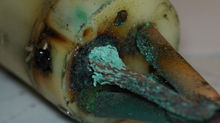Stainless steel vs. Copper cooling coil

Copper vs stainless-steel cooling coil? This question comes up typically. may be a copper immersion hair-raiser higher than a stainless-steel cooling coil? The short answer, yes. once it relates to heat exchange, copper may be a far better conductor vs. stainless-steel and can chill your wort quicker manufacturing a far better cold break and halting the transition of alpha acids (locking in your hop profile). Then why build a untarnished chiller? We'll dive deeper into their benefits and drawbacks below.
Copper Cooling Coil
Copper is that the normal material for immersion chillers due to its ability to transfer heat. 3/8" and 1/2" OD soft copper tube is most generally used and that diameter you select can depend upon the batch size.
Advantages:
1.Highest heat rate of exchange 2.Easy to control 3.Is easily soldered, welded, or brazed
Copper can develop a boring stable compound layer over time that's proof against corrosion in wort Minimal improvement is required to get rid of hop residue, wort supermolecule, and surface grime (no ought to clean copper to shiny bright) Copper and different trace minerals ar smart for the yeast
Disadvantages:
1.Copper will develop a green-blue toxic compound referred to as Verdigris (i.e. the natural coat on the sculpture of Liberty) if not keep in an exceedingly dry atmosphere. Verdigris is water soluble and may contaminate your brew if left on your hair-raiser before immersing it (easily cleansed with associate acidic resolution like StarSan or Vinegar).
2.Not as rigid as stainless-steel 3.Stainless Steel Immersion Chillers
Stainless Steel Cooling Coil
Relatively new on the scene, stainless-steel immersion chillers have gained quality within the market due to rising price of copper. stainless-steel hair-raisers will currently be purchased for constant price as a copper chiller of comparable dimensions.
Advantages:
1.The gold normal of production instrumentation 2.Excellent corrosion resistance 3.Easy to stay clean 4.Very rigid and can last a lifespan with correct care
Disadvantages:
1.Hard to control 2.Not as economical as copper resulting in a weaker cold break and longer transition of hop alpha acids. 3.Does not leave behind helpful trace minerals for yeast
Conclusion
In conclusion, the hair-raiser you select are going to be a private alternative and you cannot fail with either one. however in our skilled opinion, once it involves chilling a 5-15 gallon batch of wort, nothing comes near the potency of a properly sized copper immersion hair-raiser.










